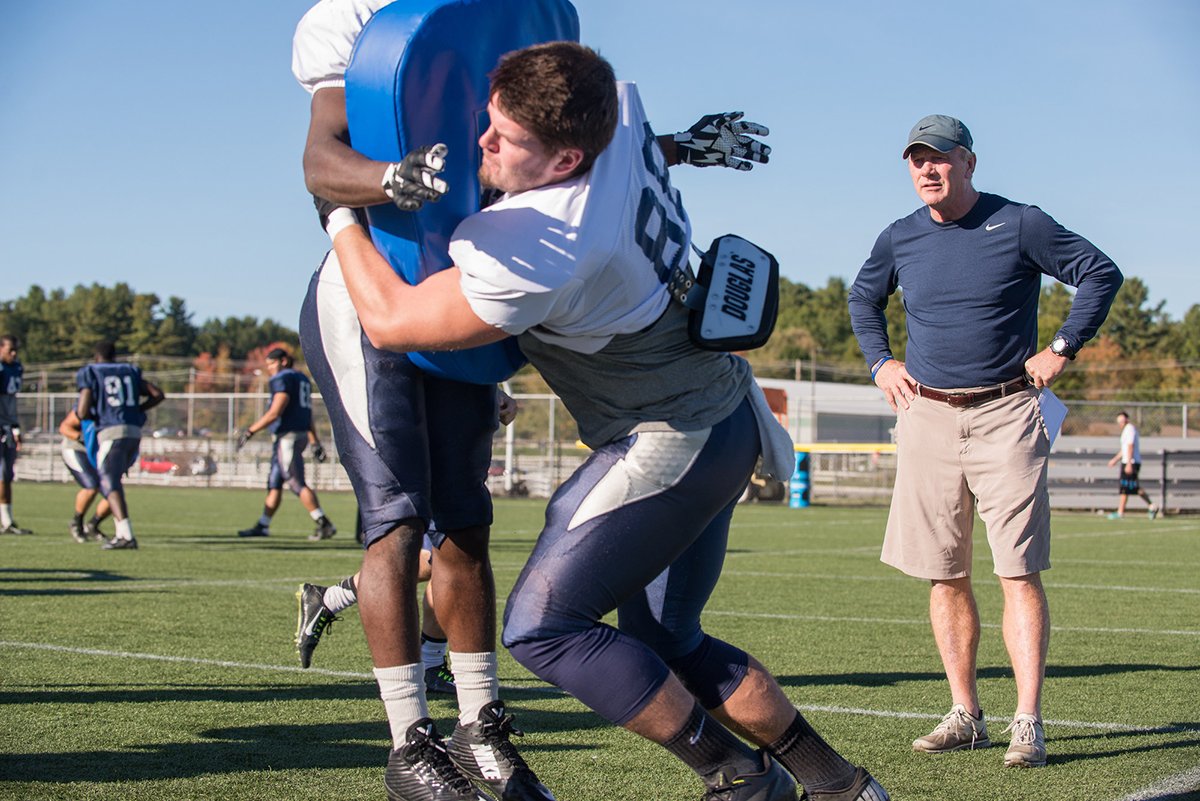Could Taking Helmets Off Lead to Fewer Concussions?

A HuTT drill. Photo courtesy of University of New Hampshire
Counterintuitive though it may seem, shedding helmets could be the next way to prevent football concussions.
The Helmet-less Tackling Training program (HuTT), developed by University of New Hampshire kinesiology professor Erik Swartz, aims to change the way football players learn and approach contact, ideally curtailing the number of head impacts they sustain in doing so.
“In what we’ve measured, practicing tackling without a helmet, for brief periods of time at a regular schedule throughout the season, decreases the number of head impacts,” Swartz explains. “The concept is that if your head is not protected, you are more likely to protect it by keeping it out of the way when you go into contact.”
To be clear, the HuTT program does not advocate helmet-less game or scrimmage play—helmets should only be taken off for the specific drills developed and taught by the program, which are to be completed under close supervision. Swartz says the exercises utilize stand-up tackling bags and padded shields to teach safe tackling form, without the full-on aggression and physicality of a game.
“The objectives of it are more to ensure the proper technique, as opposed to trying to take someone to the ground,” Swartz says. “It’s actually the perfect way to leverage the vulnerability that someone feels without a helmet in place, but not having it be the full unpredictable environment that you would have in a scrimmage or a game.”
The HuTT program is still in its beta phase, going through randomized clinical trials using the UNH football team and four high school teams from southern New Hampshire. Swartz says it’ll hopefully have limited availability by the 2016 season, and says his team is developing a manual and DVD to teach coaches how to use the program.
HuTT is poised to come to fruition as football culture, especially at the youth and collegiate levels, is moving toward safer techniques across the board. Just last week, all eight Ivy League coaches came out in support of banning full-contact practices during the regular season, in an effort to cut down on head injuries and concussions.
Swartz commends the Ivy League for publicly committing to making football safer, but says he worries that doing away with contact in practices could leave players under-prepared for game situations.
“When it comes to safety in the game, tackling is the most important skill for a player to master. So completely eliminating player-to-player contact of that nature in practice, you just wonder whether or not that increases the potential risk for game injury,” he says. “It’s just really important to do it, and refine it.”
Still, Swartz says the progress made by the Ivy League—and by youth, high school, and collegiate teams across the country—proves that the football community is changing.
“I think the majority of coaches out there are really interested in doing whatever they can to improve the safety of the sport,” he says. “The culture would hopefully appreciate that, for the first time, here’s a technique that’s being validated with a randomized control trial.”


